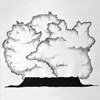 Curiously, Jon Porras' second solo album does not sound anything at all like 2011's brilliant and blackened Undercurrent.  Instead, it sounds exactly like Barn Owl.  More specifically, it sounds like the chameleonic duo's lonely, vaguely occult-sounding desert rock side.  On one hand, that is pretty disappointing, as his debut was more immediate and powerful. Also, sounding like his primary band seems to defeat the whole purpose of releasing solo work.  On the other hand, Black Mesa is an excellent album in its own right (and is much better than several actual Barn Owl releases).
Curiously, Jon Porras' second solo album does not sound anything at all like 2011's brilliant and blackened Undercurrent.  Instead, it sounds exactly like Barn Owl.  More specifically, it sounds like the chameleonic duo's lonely, vaguely occult-sounding desert rock side.  On one hand, that is pretty disappointing, as his debut was more immediate and powerful. Also, sounding like his primary band seems to defeat the whole purpose of releasing solo work.  On the other hand, Black Mesa is an excellent album in its own right (and is much better than several actual Barn Owl releases).
Although the slow-motion, sparse, twang- and delay-heavy instrumentals assembled will sound quite familiar to anyone who has heard Ancestral Star or Lost in the Glare, there is no denying that Porras has that particular niche locked down.  While he has veered into many strains of drone and avant metal over the course of his career, it is Morricone-inspired Americana that is most distinctively and uniquely his.  Obviously, Morricone's "Spaghetti Western" soundtrack work has been borrowed, referenced, and homaged to death over the years, but Porras has detoured that inspiration into a narcotic, nightmarish vision all his own.  All the tropes are certainly here, yet in Jon's hands they sound bleak, forlorn, and subtly turbulent.  Songs like "Into Midnight" don't sound even remotely swaggering or heroic–they sound like a broken Clint Eastwood turning his back on humanity and riding his horse off into the desert night to die alone.  Or summon a demon or apocalyptic rain of fire or something.
Aside from the roiling drone of Black Mesa's finale ("Beyond the Veil"), these seven songs stay pretty firmly anchored in similar (and willfully narrow) aesthetic territory: slow-moving and clean minor-key arpeggios, minimal percussion, strong and simple melodies, and a lysergic haze of e-bow shimmer.  There are some subtle variations, like the comparatively anthemic stretch of strummed chords and distorted lead guitar in "Candlelight Mirage," but the divergences all make sense within the overall dynamic arc of the album.  It is obvious that Jon set out to make something coherent and large-scale rather than just a batch of new songs.
One of my main critiques of Barn Owl has always been that some of their albums have felt very fractured and kaleidoscopic and one of my others is that Evan Caminiti and Porras often fail to give their better ideas enough time to organically unfold in order to reach their full potential.  Porras, to his credit, deftly avoids both of those historic pitfalls this time around: Black Mesa flows, breathes, and intelligently builds tension with a strong sense of purpose and clarity.  Jon doesn't make a single wrong move or play a single unnecessary note.  Obviously, such a sustained mood will probably be a bit exhausting for fans that are not particularly enthusiastic about a cinematic jangling and twanging epic of this nature (I prefer Porras' more drone-based work myself, for example), but he has rarely sounded this focused, ambitious, or masterfully edited.  This is a beautifully sequenced and evocative song suite (and a significant creative breakthough besides).
Samples:
 
Read More

